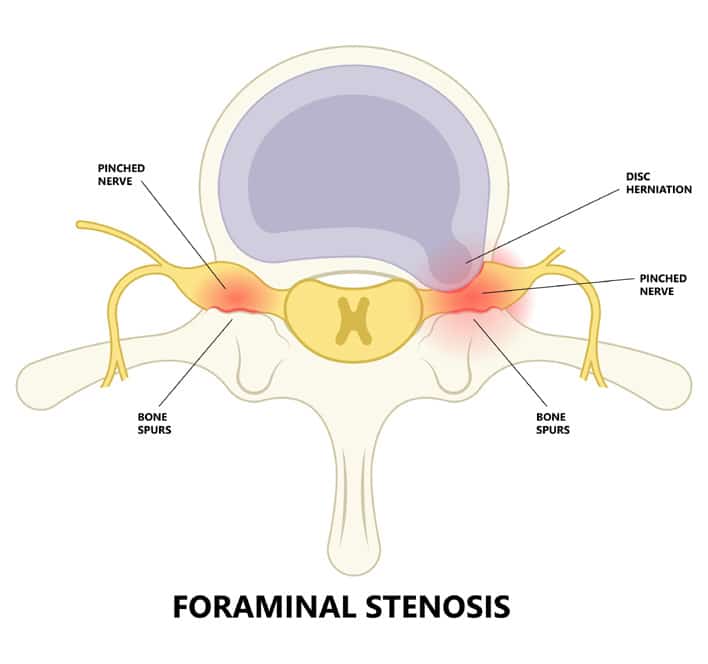The spine is a complex structure composed of bones, ligaments, vertebrae, and discs. These components work together to support and stabilize the upper body and protect the vital spinal cord. Between each of the 33 vertebrae are soft spinal discs that act as shock absorbers. These discs create small spaces known as foraminal openings, allowing nerve roots to pass through and connect the spinal cord to other body areas.
However, when the spine is compromised due to injury, disease, or degeneration, the space around the foraminal openings can narrow. This condition is known as foraminal stenosis. It can profoundly affect a person’s mobility and overall quality of life. NJ Spine & Orthopedic can help evaluate your medical records and determine what course of treatment can best help your foraminal stenosis.
What Is Foraminal Stenosis?
Foraminal stenosis occurs when the foraminal openings between the vertebrae become narrow, resulting in decreased space for the nerve roots to pass through. It is a type of spinal stenosis, which is a condition that affects the spine as it ages.
When these pathways are restricted, the nerve roots can become compressed or pinched. Depending on which nerves are affected, this can cause pain and other symptoms in various body areas.
Causes of Foraminal Stenosis
There are several possible causes of foraminal stenosis. However, the most common cause is age-related wear and tear, also known as degenerative disc disease (DDD). As we age, the discs in our spine naturally start to lose their cushioning power. They may become damaged or ruptured, narrowing the foraminal openings and compression of the nerve roots.
Other causes of foraminal stenosis include:
- Trauma or injury to the spine
- Spinal tumors or cysts
- Bone spurs
- Spinal stenosis
- Bulging discs
- Herniated discs
- Spondylolisthesis
- Spinal infections, such as rheumatoid arthritis
- Spinal deformities, such as scoliosis
- Lack of exercise or posture problems
Symptoms of Foraminal Stenosis
The symptoms of foraminal stenosis depend on where the nerves are compressed. Generally, they will be felt anywhere along the nerve path from the spine to its destination. Below are some of the most common symptoms associated with foraminal stenosis.
Cervical Foraminal Stenosis
This type of foraminal stenosis may showcase symptoms like:
- Pain, numbness, or tingling in the legs, feet, arms, or hands
- Weakness in the legs or arms
- Muscle spasms in the back or neck area
- Loss of bladder control
- Loss of balance or coordination
You may also experience difficulty with walking, bending, or lifting
Thoracic Foraminal Stenosis
Thoracic foraminal stenosis may result from:
- Pain that radiates into the chest or abdomen
- Pain or numbness that runs along the ribs
- Shortness of breath
- Abdominal pain
You could also experience difficulty with standing upright for long periods of time.
Lumbar Foraminal Stenosis
Lastly, lumbar foraminal stenosis could present with symptoms like:
- Lower back pain that radiates into one or both legs
- Numbness, tingling, or weakness in the buttocks, legs, or feet
- Pain that intensifies when sitting, standing for long periods, bending forward, or lifting objects
- Loss of bladder control
There may also be a loss of motor function in the lower extremities.
Contact Our Spine Neurosurgeons at NJ Spine & Orthopedic
While foraminal stenosis is a serious condition, it can be managed with the right treatment. It is important to consult your doctor if you are experiencing any of the symptoms associated with this condition. Additionally, proper self-care can help reduce the risk of developing foraminal stenosis or slow its progression. Taking steps to ensure that your spine remains healthy and strong is vital to maintain a good quality of life.
At NJ Spine & Orthopedic, our spine surgeons are experienced in diagnosing and treating foraminal stenosis. We understand that every case is different and requires a tailored treatment plan considering your unique needs. Our specialists will work with you to develop the best action plan for your specific condition. Our Concierge Team will also help streamline your appointments and travel needs. Contact us at (866) 553-0612 or book an appointment online today to learn more about our services.

